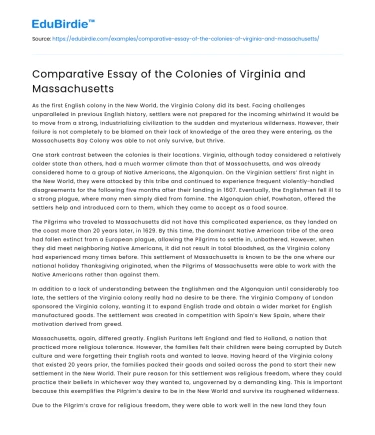As the first English colony in the New World, the Virginia Colony did its best. Facing challenges unparalleled in previous English history, settlers were not prepared for the incoming whirlwind it would be to move from a strong, industrializing civilization to the sudden and mysterious wilderness. However, their failure is not completely to be blamed on their lack of knowledge of the area they were entering, as the Massachusetts Bay Colony was able to not only survive, but thrive.
One stark contrast between the colonies is their locations. Virginia, although today considered a relatively colder state than others, had a much warmer climate than that of Massachusetts, and was already considered home to a group of Native Americans, the Algonquian. On the Virginian settlers’ first night in the New World, they were attacked by this tribe and continued to experience frequent violently-handled disagreements for the following five months after their landing in 1607. Eventually, the Englishmen fell ill to a strong plague, where many men simply died from famine. The Algonquian chief, Powhatan, offered the settlers help and introduced corn to them, which they came to accept as a food source.
Save your time!
We can take care of your essay
- Proper editing and formatting
- Free revision, title page, and bibliography
- Flexible prices and money-back guarantee
The Pilgrims who traveled to Massachusetts did not have this complicated experience, as they landed on the coast more than 20 years later, in 1629. By this time, the dominant Native American tribe of the area had fallen extinct from a European plague, allowing the Pilgrims to settle in, unbothered. However, when they did meet neighboring Native Americans, it did not result in total bloodshed, as the Virginia colony had experienced many times before. This settlement of Massachusetts is known to be the one where our national holiday Thanksgiving originated, when the Pilgrims of Massachusetts were able to work with the Native Americans rather than against them.
In addition to a lack of understanding between the Englishmen and the Algonquian until considerably too late, the settlers of the Virginia colony really had no desire to be there. The Virginia Company of London sponsored the Virginia colony, wanting it to expand English trade and obtain a wider market for English manufactured goods. The settlement was created in competition with Spain’s New Spain, where their motivation derived from greed.
Massachusetts, again, differed greatly. English Puritans left England and fled to Holland, a nation that practiced more religious tolerance. However, the families felt their children were being corrupted by Dutch culture and were forgetting their English roots and wanted to leave. Having heard of the Virginia colony that existed 20 years prior, the families packed their goods and sailed across the pond to start their new settlement in the New World. Their pure reason for this settlement was religious freedom, where they could practice their beliefs in whichever way they wanted to, ungoverned by a demanding king. This is important because this exemplifies the Pilgrim’s desire to be in the New World and survive its roughened wilderness.
Due to the Pilgrim’s crave for religious freedom, they were able to work well in the new land they founded because it was truly home for them, where they would end up spending the rest of their lives and growing generations of their family. Their lifestyle naturally included cooperation and hard work, and so living in a new and probably scary place wasn’t so hard. Meanwhile, the Englishmen still considered their home to be England, and living in Virginia was a job for them that they actually did not want to participate in. Their inexperience, unwillingness to work, and lack of wilderness survival skills led to bickering and disagreements among the men themselves and created an unhealthy environment to build a settlement on. With no personal motivation, the men must have found it difficult to grow a colony they couldn’t see the future of.
In conclusion, Massachusetts was able to succeed as a colony due to the values and reasons it was built on, and the moral strength the individuals living in it possessed. The Massachusetts Bay colony was able to cooperate with the Natives, a crucial necessity on an unknown land, and created valuable connections for trade. The Virginia colony, although not entirely its fault, had created issues with the Natives the moment they stepped on shore, literally. Unable to unite for the betterment of both of their societies, the English suffered casualty upon casualty, adding to a total of 400 lost men over 5 months. In addition, Massachusetts Pilgrims had a desire to be on the land they founded, as their religious motivation pushed them to a land where they could feel secure from religious persecution. The first men to attempt to colonize the area of Virginia had no personal motivation and were there only for a company that wanted the piece of land for better trade opportunities. The motivation behind the individuals who settle a piece of land is incredibly important and correlates to the success of the settlement, as well displayed by both the Massachusetts Bay and Virginia colonies.






 Stuck on your essay?
Stuck on your essay?

